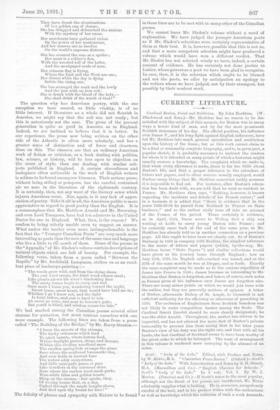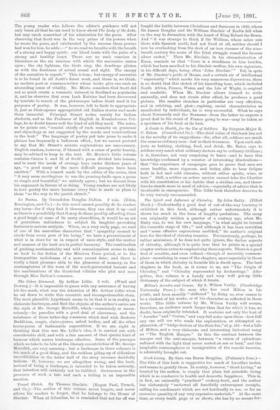Scott : "Lady of the Lake." Edited, with Preface and
Notes, by W. Minto, M.A., "Clarendon Press Series." (Oxford.)—Scott's "Lady of the Lake." With Introduction and Notes by G. H. Stuart, M.A. (Macmillan and Co.)—" English Classics for Schools " Scott's "Lady of the Lake." In 3 vols. Vol. I. By W. J. Mork°. (Percival and Co.)—If Scott's notes to the most popular, although not the finest of his poems, are insufficient, Mr. Minto admirably supplies what is lacking. He is, moreover, scrupulously careful of the text, and in his preface writes with the enthusiasm as well as knowledge which the criticism of such a work demands. The young reader who follows the editor's guidance will not only learn all that he can need to know about The Lady of the Lake, but may catch somewhat of his admiration for the poem. After observing that Scott was in the very prime of his powers when he wrote the poem, and exhilarated by the success those powers had won for him, he adds :—"As we read we breathe with the breath of a strong and happy spirit ; our blood beats with the pulse of a strong and healthy heart. There are no such sunrises in literature as the six sunrises with which the successive cantos open ; the sky lightens, the birds sing, the dewdrops glisten as with the freshness of actual sound and sight. The energy of the narrative is superb." This is true; but energy of narrative is to be found in all Scott's finest work, and there is, we think, no modern poet or romance-writer whose books give one such an abounding sense of vitality. Mr. Minto considers that Scott did not so much create a romantic interest in Scotland as popularise it, and he observes that even Loch Katrine had been discovered by tourists in search of the picturesque before Scott used it for purposes of poetry. It was, however, left to Scott to appropriate it, just as Shakespeare appropriated old Italian stories and made them immortal. Principal Stuart writes mainly for Indian students, and as the Professor of English in Kumbakonam Col- lege, he no doubt knows well the kind of aid they need. The notes, as he points out, "consist chiefly of such remarks on grammar and etymology as are suggested by the words and constructions in the text." The language of poetry put into prose to make it plainer has frequently a ludicrous effect.; but we cannot pretend to say that Mr. Stuart's minute explanations are unnecessary. English readers, however, if blessed with a sense of poetic beauty, may be advised to keep to the text. Mr. Morice's little volume contains Cantos I. and II. of Scott's poem divided into lessons, and to meet the needs of average boys under thirteen years of age, "a good many of the more difficult passages have been omitted." With a remark made by the editor of the series, that "it may seem sacrilegious to use the pruning-knife upon a poem so simple and beautiful," we entirely agree ; but we dissent from his argument in favour of so doing. Young readers are not likely to love poetry the more because every line is made as plain to them "as the way to the parish church."



































 Previous page
Previous page